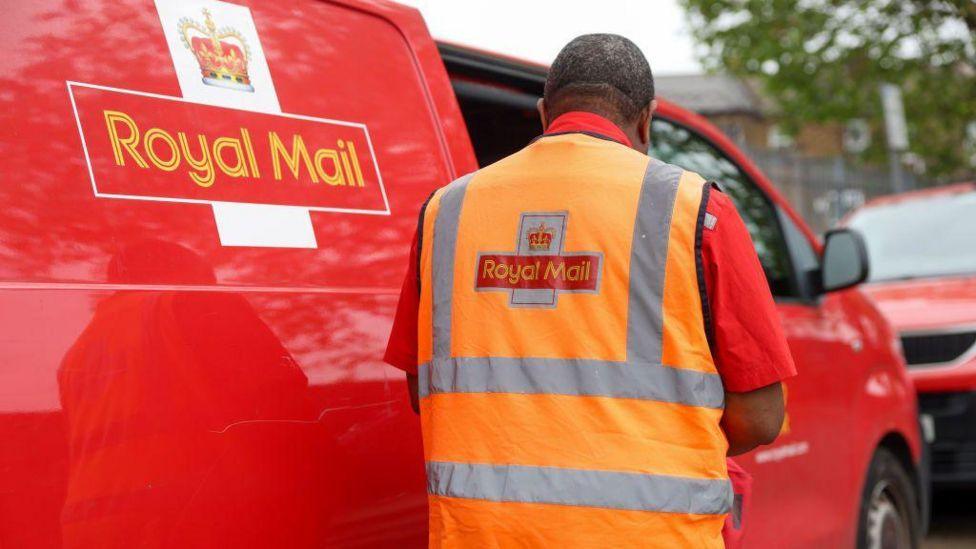First-class stamp price to rise to £1.65

- Published
Royal Mail has announced it will hike the price of first-class stamps by 30p due to "very real and urgent" financial challenges.
The increase, which will kick in from 7 October, will see the price of a first-class stamp rise to £1.65, while second-class stamps will remain at 85p.
The company said it was facing pressure from declining letter volumes and rising business costs in maintaining the one-price-goes-anywhere universal service.
It has called for the service terms, under which it is legally obliged to deliver letters six days per week, Monday to Saturday, and parcels Monday to Friday, to be reformed.
"We always consider price increases very carefully. However, when letter volumes have declined by two-thirds since their peak, the cost of delivering each letter inevitably increases," said Nick Landon, chief commercial officer at Royal Mail.
"We are proud to deliver the Universal Service, but the financial cost is significant."
The decision to increase first-class stamp prices comes after the UK's postal regulator said on Thursday that the company could be allowed to end the delivery of second-class letters on Saturdays, as part of reforms being considered.
Ofcom has also said it is looking into whether to allow second-class deliveries to be made on alternate weekdays, which could help cut costs for Royal Mail.
But on Friday, Royal Mail said it still had "no certainty on regulatory reform".
The company, which was split from the Post Office and privatised a decade ago, has repeated its argument that the universal service is in need of "urgent reform".
It said that its minimum requirements had not changed for more than 20 years, despite changes in how people communicate.
In recent years, the volume of letters being posted has plummeted, while parcel deliveries have become more popular - and more profitable for Royal Mail.
But despite parcel postage growing and stamps being hiked several times in the past two years, the company has struggled financially, making a heavy £419m loss last year.
Royal Mail's performance has also deteriorated, with customers regularly not receiving letters on time, particularly for medical appointments and legal documents.
"The rate of letter decline and ongoing losses means that Royal Mail has had to take the necessary steps within its power to address the very real and urgent financial sustainability challenge the universal service faces right now," the company said.
According to Royal Mail, the amount of letters being posted have fallen from 20 billion a year in 2004-05, to about 6.7 billion in 2023-24, with the average household receiving four letters per week, compared with 14 about two decades ago.
Second class letter deliveries on Saturdays could be cut
- Published5 September 2024
Would it bother you if you only got mail three days a week?
- Published28 January 2024
Royal Mail has estimated that reforming second class services, plus changing its performance targets, could save the business £300m a year.
It had proposed axing second class mail on Saturdays as well alternate weekday deliveries - both of which options are now being examined by Ofcom.
However, reforming the postal service by cutting delivery days would require the government and parliament to change the current legislation.
Ofcom has said no final decision had been made on reforms. It aims to publish a consultation early next year and make a decision in the summer.
Royal Mail's parent company International Distribution Services is in the process of being bought by Czech billionaire Daniel Kretinsky for £3.57bn.
Mr Kretinsky has committed in writing to honouring the universal service obligation, but only for five years.
The takeover will face a government probe, including into potential links with Russia.